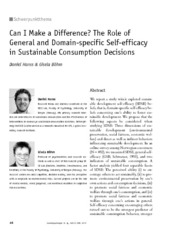Can I Make a Difference? The Role of General and Domain-specific Self-efficacy in Sustainable Consumption Decisions
Journal article
Published version
Permanent lenke
https://hdl.handle.net/1956/6238Utgivelsesdato
2010Metadata
Vis full innførselSamlinger
Sammendrag
We report a study which explored sustainable development self-efficacy (SDSE) beliefs, that is, domain-specific self-efficacy beliefs concerning one’s ability to foster sustainable development. We propose that the following aspects be considered when studying SDSE: Three dimensions of sustainable development (environmental preservation, social fairness, economic welfare) and direct as well as indirect behaviors influencing sustainable development. In an online survey among Norwegian consumers (N = 402), we measured SDSE, general selfefficacy (GSE; Schwarzer, 1993), and two indicators of sustainable consumption. A factor analysis yielded four separable facets of SDSE: The perceived ability (i) to encourage others to act sustainably, (ii) to promote environmental preservation by one’s own actions and consumption decisions, (iii) to promote social fairness and economic welfare through one’s consumption, and (iv) to promote social fairness and economic welfare through one’s actions in general. Self-efficacy concerning encouraging others turned out to be the strongest predictor of sustainable consumption behavior, stronger than self-efficacy concerning directly preserving the environment. The latter was a significant predictor only for choices of ecological produce. GSE did not contribute to predicting sustainable consumption. We discuss the structure of the SDSE concept, its role in shaping sustainable consumption decisions, and how it might be extended in future studies.
